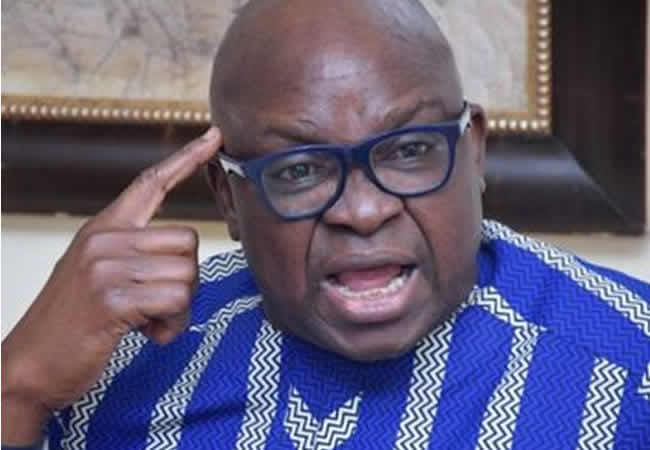Ayodele Fayose, a notable figure from Ekiti State and former governor, has expressed dire sentiments regarding the ongoing issues plaguing the Peoples Democratic Party (PDP). In a recent interview on Channels Television, he remarked that the PDP’s disarray following its losses in the 2023 general elections could only be remedied through a miraculous turnaround. Fayose underscored the significant impact of the party’s electoral defeat, noting that the ramifications of this loss continue to reverberate within the organization. He attributed part of the party’s internal turmoil to the perceived arrogance and mismanagement of certain prominent members, suggesting that when leadership struggles, the entire party suffers.
Fayose emphasized the need for collective introspection among PDP leadership to chart a path forward. He stated that the internal conflicts, marked by incidents of suspensions and counter-suspensions among party members, signal a deep-rooted problem that goes beyond mere politicking. The former governor underscored the importance of unity and the necessity for the party’s key figures to reflect on the past and learn from their previous errors. His call for reconciliation and mutual understanding was clear; he argued that without addressing past grievances, the party risks failing to secure a stable future.
The ongoing instability within the PDP is pronounced, with no resolution in sight as factions within the party continue to clash. Fayose’s comments reflect a growing concern that the strife is not only damaging for the PDP as an organization but also opens the party to vulnerabilities against its political competitors. The conflict reached a new peak just days prior to his remarks, as one faction of the National Working Committee (NWC) suspended acting National Chairman Umar Damagum and National Secretary Samuel Anyanwu for alleged disloyalty. This incident highlighted the intensifying power struggles within the party and served as a manifestation of its fractured state.
On the other hand, the faction supportive of Damagum quickly reacted by suspending National Legal Adviser Kamaldeen Ajibade and National Publicity Secretary Debo Ologunagba, also citing disloyalty. The situation escalated further when Ologunagba announced the suspension of both Damagum and Anyanwu, marking the chaos as a hallmark of the PDP’s current crisis. This series of mutual suspensions presents a worrying trend for the party, highlighting a lapse in discipline and unity among its leadership. The ongoing tensions are a troubling sign for the PDP, pointing to a larger issue of governance and cohesion that must be addressed if the party is to reclaim its standing in national politics.
The situation within the PDP also reflects broader themes of political dynamics in Nigeria, specifically the high stakes associated with party loyalty and alignment. Fayose’s insistence on the need for humility among party leaders aligns with the historical context of political operations in Nigeria, where internal conflicts can lead to significant electoral repercussions. The narrative of reflection and unity presented by Fayose resonates as an urgent call for members to prioritize the party’s survival and relevance in Nigerian politics over personal or factional ambitions.
In conclusion, Ayodele Fayose has laid bare the critical challenges facing the PDP in the wake of its electoral failures. His remarks serve as a stark reminder of the importance of leadership integrity, cohesive strategy, and a commitment to rectify past errors in order to foster a unified and effective opposition party. The path forward, according to Fayose, is steeped in self-reflection and a willingness to reconcile, imperative for the PDP to not only heal but also re-establish its political credibility amidst ongoing internal discord and a competitive political landscape.














